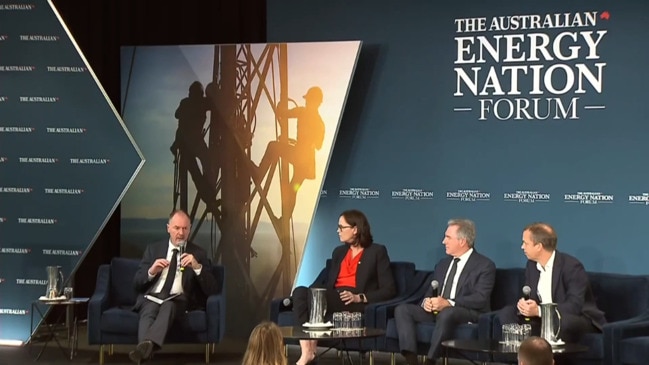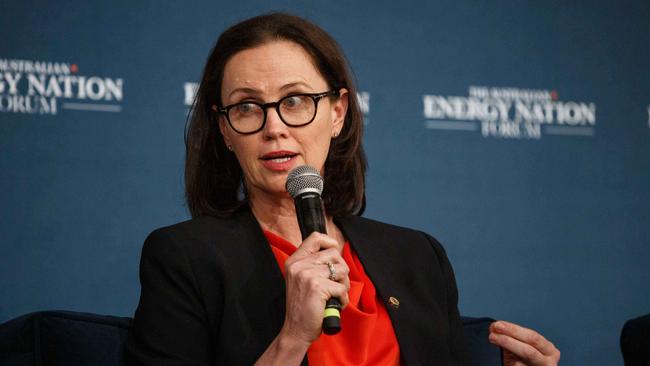Shell calls for streamlined regulatory process on energy projects
Shell has called for the removal of duplication and inconsistency across state and national energy regimes, amid growing concerns over project and planning delays.

Shell, one of Australia’s largest foreign investors, has urged the federal government to remove duplication and inconsistency across state and national energy regimes to create a “single front door” across all energy projects in Australia.
Shell’s country chair Cecile Wake told The Australian’s Energy Nation Forum a more streamlined process should apply beyond renewable energy projects. Her comments come amid growing concerns around regulatory bottlenecks and environment planning delays that can stymie and delay energy project time lines.
“The renewable energy agreements that minister (Chris) Bowen was speaking about between himself and the state energy ministers, let’s broaden them so that we deliver successful projects across the length and breadth of our economy,” Ms Wake said. “Energy is the economy. Energy is the future. And we’ve got a great opportunity, but we mustn’t … squander our traditional strengths.”
She said an agreement covering business, government and consumers was required to traverse the complex energy transition, which wouldn’t happen without trade-offs, costs and difficult choices.
“We just need to have that clear-eyed, transparent dialogue.”
Ms Wake also noted the energy policy debate would need to broach subjects including incentives, subsidies and production credits.
Shell is one of the dominant players in Australia’s energy sector, operating the QCLNG export plant in Queensland, the Prelude floating LNG project off northern Australia and also has stakes in Western Australia’s North West Shelf and Gorgon LNG ventures and gas business Arrow.
Ms Wake called for a pragmatic approach and a “shared vision” among stakeholders for the nation to best navigate and capitalise on the energy transition happening across markets globally.
“We need to stop demonising gas, we need to look more broadly than simply the … renewable penetration in the electricity mix, we need to look to biofuels. We need to at least have a conversation around nuclear,” she said, noting Shell did not operate in the nuclear space as it wasn’t a competitive strength.

Wednesday’s forum was held amid rising speculation of an early election and a flare-up in the energy and climate wars. Large Australian and offshore-based companies are also positioning to benefit from burgeoning industries and policies that emerge as a result of the changes.
GrainCorp chief executive Robert Spurway told the forum it was up to government to get policy settings right, for industries such as biofuels, that would allow Australia to leverage its “natural advantage”.
“If you take the canola seed we produce here it has a carbon intensity benefit about 41 per cent better than the global average,” he said. “There’ll be efficiencies of scale at the right policy settings, but also some real natural advantage benefits that Australia can bring to this future industry.”
GrainCorp last week backed the federal government’s launch of a consultation process assessing the incentives needed to develop an Australian renewable fuels industry.
Mr Spurway last week outlined that the nation’s growers produce a surplus average up to 5 million tonnes of the oilseed exported annually over the last three years, with more than 60 per cent of that refined into biofuels.
GrainCorp is forging ahead with plans to expand its oilseed crush capacity and has aligned with IFM Investors, who are focused on establishing a domestic sustainable aviation fuel (SAF) sector as a significant manager of investments in Australian and global airports.
Ampol CEO Matt Halliday agreed with Mr Spurway on getting policy settings right for the biofuel sector.
“It’s fair to say that what we’re talking about from an advanced biofuels and a renewable fuels perspective, will not happen without the appropriate policy,” he said.
“Most of this feedstock today, from an agricultural point of view is exported, and that is largely because there is government policy support elsewhere.”
Mr Halliday noted production incentives were one measure that could level the playing field, as he also reiterated his view that government policies needed to encourage demand and stamp out additional cost to consumers.








To join the conversation, please log in. Don't have an account? Register
Join the conversation, you are commenting as Logout